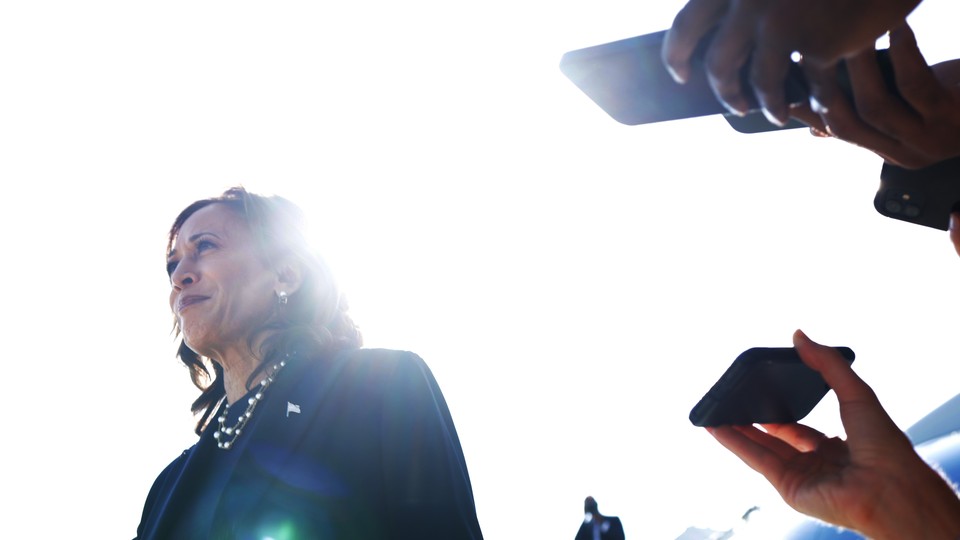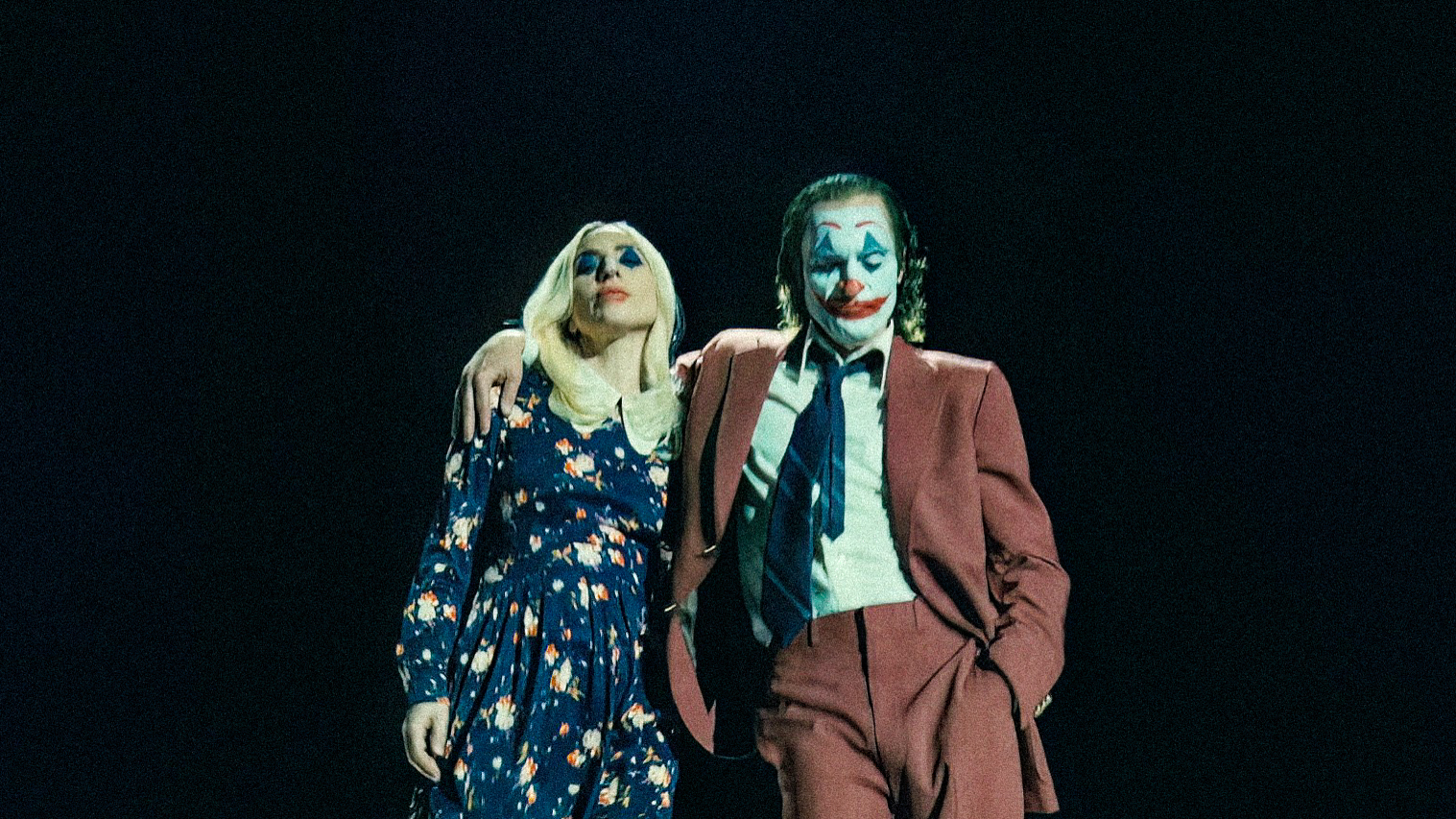Why Trump and Harris Are Turning to Podcasts
7 min read
This is an edition of The Atlantic Daily, a newsletter that guides you through the biggest stories of the day, helps you discover new ideas, and recommends the best in culture. Sign up for it here.
Kamala Harris is in the midst of a media blitz this week, including an interview on CBS’s 60 Minutes yesterday evening and an appearance on TheLate Show With Stephen Colbert tonight. But she is also dipping into the world of mega-popular, not straightforwardly journalistic podcasts—notably appearing on the show Call Her Daddy last weekend. I spoke with my colleague Helen Lewis, who covers the podcast-sphere, about why Donald Trump and Harris are both spending time on these sorts of shows, what these interviews avoid, and how independent podcasters became major players in political media.
The New Mainstream
Lora Kelley: How does the value to the viewer of a traditional press interview—one focused on the specific issues and policies of the race—differ from that of a lifestyle podcast?
Helen Lewis: Roughly speaking, there are two types of sit-down conversations in politics: the accountability interview and the talk-show appearance. One focuses on pinning down candidates on their past statements and their future promises; the other, which most podcasts fall into, tries to understand the candidate as a person. The latter aren’t necessarily soft options—being charismatic and engaging while making small talk or fielding deeply personal questions is a skill in itself. (And I found Donald Trump’s appearance on Theo Von’s podcast, where he talked about his elder brother’s struggle with alcoholism, very revealing indeed.)
But only with the accountability interviews do you get candidates pressed repeatedly on questions that they’re trying to dodge. On Logan Paul’s podcast, Impaulsive, Trump was asked about the transmission of fentanyl over the border, and he got away with rambling about how “unbelievable” the German shepherds Border Patrol officers use are. On Lex Fridman’s podcast, Trump asserted that he could easily sort out the crisis in Ukraine—and that was it. Who needs details? When Kamala Harris went on Call Her Daddy, the host, Alex Cooper, gave her a chance to lay out her message on reproductive rights but didn’t, for example, challenge her on whether she supports third-trimester abortions, which are deeply divisive.
Lora: From the perspective of a political campaign, are there any downsides to appearing on a podcast such as Call Her Daddy?
Helen: The obvious criticism of Harris appearing on Call Her Daddy, which has a young, female audience, is that she already has a big lead among young women aged 18–25. You can say the same about Trump appearing on podcasts that are popular with young men. But both groups contain many people who will be undecided about whether to vote at all.
Lora: Harris has done some traditional press interviews during this campaign cycle, including her 60 Minutes interview yesterday. But are we in a new era in which chats with friendly podcasters rival (or even overtake) traditional media interviews?
Helen: Well, quite. An article I think about a lot is John Herrman’s 2015 “Access Denied,” in which he asked why an A-lister—someone like Kim Kardashian—would give an interview to a celebrity magazine if she had something to sell, instead of simply putting a picture on Instagram. Why cooperate with the old guard of media when they are no longer the gatekeepers of attention? Herrman argued that the traditional media was suffering a “loss of power resulting in a loss of access resulting in further loss of power.”
That dynamic has now migrated to politics. The legacy brands no longer have a monopoly on people’s attention, and the online right, in particular, has been extremely successful in building an alternative, highly partisan media. Fox News is no longer the rightmost end of the spectrum—beyond that is Tucker Carlson’s podcast, or the Daily Wire network, or Newsmax, or Elon Musk’s X.
Now candidates tend to talk to the traditional media only when they want to reset the narrative about them, because other journalists still watch 60 Minutes or whatever it might be. There’s still a noisiness around a big legacy interview that you don’t get with, say, Call Her Daddy—even if more people end up consuming the latter.
Lora: Are these podcasts really doing anything new, or are they largely replicating traditional media interviews without the same standards and accountability?
Helen: The better ones strive for impartiality and don’t, for example, reveal their questions in advance—but many political podcasts are wrapped in an ecosystem where big-name guests mean more advertising revenue, and thus bigger profits for the hosts personally; plus, their only hope of getting a second interview is if the candidate feels the first one was sympathetic. Compare that with 60 Minutes, which interviewed Trump so robustly in 2020 that he has asked for an apology.
I’m as guilty as anyone, but we need to stop treating these podcasts as the “alternative” media when they are absolutely the mainstream these days. The top ones have audiences as big as, if not bigger than, most legacy outlets. If they don’t want to hire all the editorial infrastructure that traditional journalism has (such as fact-checkers, research assistants, etc.), or risk being unpopular by asking difficult questions, that’s on them. Joe Rogan renewed his Spotify contract for $250 million. Alex Cooper signed a deal with SiriusXM this year worth $125 million. We should stop treating the mega-podcasts like mom-and-pop outfits competing with chain stores. They’re behemoths.
Lora: You recently wrote about The Joe Rogan Experience,which is the top-listened-to podcast on Spotify andarguably the most influential behemoth of them all. Why haven’t the candidates gone on the show yet? Who from each ticket do you think would make the most sense as a guest?
Helen: As I understand it, Team Trump would love to get on The Joe Rogan Experience. The two politicians that Rogan adores are Tulsi Gabbard and Robert F. Kennedy Jr., who are now both working with the Republicans, and Team Trump would hope to encourage some of Rogan’s audience of crunchy, COVID-skeptic libertarians to follow them in moving from the independent/Democrat column to the GOP. But Rogan isn’t a full MAGA partisan like some of his friends, and Trump recently said that Rogan hasn’t asked him to appear.
In any case, I think Rogan would prefer to talk to J. D. Vance, who is very much part of the heterodox Silicon Valley–refugee tendency that he admires. For the Democrats, Harris might struggle to relax into the stoner-wonderment vibe of Rogan, given the tight-laced campaign she’s running. Rogan and Tim Walz could probably have a good chat about shooting deer and the best way to barbecue.
Related:
- What going on Call Her Daddy did for Kamala Harris
- How Joe Rogan remade Austin
Here are three new stories from The Atlantic:
- Milton is the hurricane that scientists were dreading.
- David Frum: Behind the curtain of Mexico’s progress
- Donald Trump flirts with race science.
Today’s News
- Florida Governor Ron DeSantis announced that roughly 8,000 National Guard members will be mobilized by the time Hurricane Milton, a Category 5 storm, makes landfall this week.
- The Supreme Court appears likely to uphold the Biden administration’s regulation of “ghost gun” kits, which allow people to buy gun parts and build the weapons at home.
- Prime Minister Benjamin Netanyahu claimed that the Israeli military has killed the replacement successors of the Hezbollah leader Hassan Nasrallah, who was killed in an Israeli air strike last month.
Dispatches
- Atlantic Intelligence: The list of Nobel laureates now contains two physicists whose 1980s research laid the foundations for modern artificial intelligence, Matteo Wong writes.
Explore all of our newsletters here.
Evening Read

They Were Made Without Eggs or Sperm. Are They Human?
By Kristen V. Brown
The little clump of cells looked almost like a human embryo. Created from stem cells, without eggs, sperm, or a womb, the embryo model had a yolk sac and a proto-placenta, resembling a state that real human embryos reach after approximately 14 days of development. It even secreted hormones that turned a drugstore pregnancy test positive.
To Jacob Hanna’s expert eye, the model wasn’t perfect—more like a rough sketch … But in 2022, when two students burst into his office and dragged him to a microscope to show him the cluster of cells, he knew his team had unlocked a door to understanding a crucial stage of human development. Hanna, a professor at the Weizmann Institute of Science in Israel, also knew that the model would raise some profound ethical questions.
Read the full article.
More From The Atlantic
- Israel and Hamas are kidding themselves, Hussein Ibish argues.
- The New York race that could tip the House
Culture Break

Read. Lauren Elkin’s latest novel, Scaffolding, suggests that total honesty can take a marriage only so far, Lily Meyer writes.
Watch (or skip).Joker: Folie à Deux (out now in theaters) has nothing interesting to say about the challenges of fame, Spencer Kornhaber writes.
Play our daily crossword.
Stephanie Bai contributed to this newsletter.
When you buy a book using a link in this newsletter, we receive a commission. Thank you for supporting The Atlantic.



